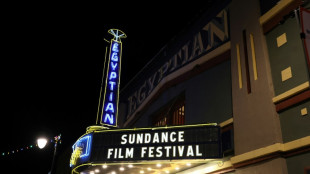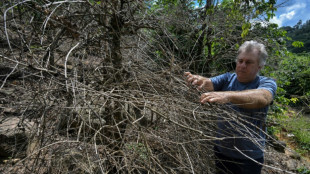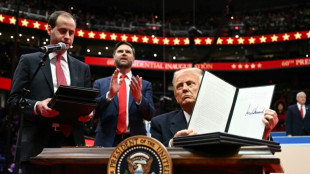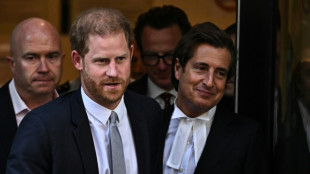
-
 China, EU, Ukraine leaders take Davos stage under Trump shadow
China, EU, Ukraine leaders take Davos stage under Trump shadow
-
Love and rights: Thailand's same-sex marriage milestone

-
 Gauff stunned as Djokovic, Alcaraz square up in Melbourne blockbuster
Gauff stunned as Djokovic, Alcaraz square up in Melbourne blockbuster
-
Trump 2.0 boosts interest in Davos: World Economic Forum chief

-
 EU's legal weapon facing the heat from US big tech
EU's legal weapon facing the heat from US big tech
-
6.0-magnitude earthquake shakes Taiwan

-
 Trump vows to take Panama Canal, urges Putin to make Ukraine deal
Trump vows to take Panama Canal, urges Putin to make Ukraine deal
-
Emotional Badosa stuns Gauff to reach Australian Open semi-finals

-
 Trump's climate retreat shines light on green leaders
Trump's climate retreat shines light on green leaders
-
S.Korea's suspended president to attend impeachment hearing

-
 Trump signs order to pull US from WHO, citing funding disparities
Trump signs order to pull US from WHO, citing funding disparities
-
Trump grants pardons to 1,500 US Capitol rioters

-
 Asian markets swing as Trump revives tariff fears on taking office
Asian markets swing as Trump revives tariff fears on taking office
-
Facing Trump and Musk, EU lawmakers seek sure footing

-
 Trump unleashes first day blitz with promise of new 'golden age'
Trump unleashes first day blitz with promise of new 'golden age'
-
Starry Sundance fest moves ahead in wake of LA fires

-
 Brazil drought lights a fire under global coffee prices
Brazil drought lights a fire under global coffee prices
-
Trump's climate retreat shines light on other green leaders

-
 Trump declares national emergency, troop deployments at Mexico border
Trump declares national emergency, troop deployments at Mexico border
-
Revitalised Man City confident for PSG 'final': Guardiola

-
 Conceicao demands more hunger as AC Milan eye Champions League top eight
Conceicao demands more hunger as AC Milan eye Champions League top eight
-
Mbappe dispels doubts before crucial Real Madrid Champions League clash

-
 The global forces sending coffee prices skyward
The global forces sending coffee prices skyward
-
Trump leaves Paris climate agreement, doubles down on fossil fuels

-
 Trump decrees end of diversity programs, LGBTQ protections
Trump decrees end of diversity programs, LGBTQ protections
-
Trump says could impose 25% tariffs on Canada, Mexico on Feb 1

-
 Prince Harry's battle against Murdoch UK tabloids goes to trial
Prince Harry's battle against Murdoch UK tabloids goes to trial
-
Musk raises eyebrows with salute gesture at Trump rally

-
 Trump signs pardons for 1,500 Capitol rioters
Trump signs pardons for 1,500 Capitol rioters
-
Trump promises new US 'golden age' with blitz of presidential orders

-
 Rubio wins unanimous nod to be top US diplomat
Rubio wins unanimous nod to be top US diplomat
-
Trump says will sign pardons for Capitol rioters

-
 Rubio on track to take office quickly as US secretary of state
Rubio on track to take office quickly as US secretary of state
-
Chelsea beat Wolves to return to Premier League top four

-
 'Please let us in': Trump crackdown leaves migrants in tears
'Please let us in': Trump crackdown leaves migrants in tears
-
Trump says to declare national emergency at border, use military

-
 Chelsea beat Wolves to climb back into Premier League top four
Chelsea beat Wolves to climb back into Premier League top four
-
'Daddy's home': Trump diehards celebrate in icy Washington

-
 Trump vows new US 'golden age' as second term begins
Trump vows new US 'golden age' as second term begins
-
'Extremely critical' risk as winds whip fire-weary Los Angeles

-
 Trump vows to plant flag on Mars, omits mention of Moon return
Trump vows to plant flag on Mars, omits mention of Moon return
-
Trump vows to 'tariff and tax' other countries

-
 Top-ranked Scheffler won't 'rush back' to golf after Christmas hand injury
Top-ranked Scheffler won't 'rush back' to golf after Christmas hand injury
-
Trump vows to 'tariff and tax' on other countries

-
 Aston Villa ready for 'key' Monaco clash, says Emery
Aston Villa ready for 'key' Monaco clash, says Emery
-
Netanyahu vows to quash Gaza 'threat' on second day of truce

-
 Trump seeks to rename Denali, highest peak in N. America
Trump seeks to rename Denali, highest peak in N. America
-
Trump vows US 'taking back' Panama Canal despite 'peacemaker' pledge

-
 'Daddy's home': Trump fans flock to DC but watch inauguration on TV
'Daddy's home': Trump fans flock to DC but watch inauguration on TV
-
'Dear friend': Nations react to Trump inauguration


Algeria's 60 years of complex relations with former occupier France
In the 60 years since Algeria won independence from France, it has gone through multiple crises with its former occupier, often fuelled by domestic politics.
Yet the two sides had surprisingly good relations for the first four decades, and it was only in the 1990s that things started to fall apart, experts say.
"Generally, despite appearances and criticism, there has been a stable, very balanced relationship," said Luis Martinez, a Maghreb researcher at Sciences Po university in Paris.
That is despite the devastation caused by the eight-year war of independence that finally led to the signing of the Evian accords on March 18, 1962, ending the conflict.
French historians say half a million civilians and combatants died -- 400,000 of them Algerian -- while the Algerian authorities insist 1.5 million were killed.
Under French General Charles de Gaulle, whose administration signed the accords, and his successor Georges Pompidou, Paris had good relations with Algiers.
The same was true of the administration of Francois Mitterrand, even though he had been interior minister when Algeria's armed independence struggle began in 1954 and remained opposed to the country's independence.
"Mitterrand was surrounded by Socialist Party people, who were all pro-FLN," said historian Pierre Vermeren, referring to the National Liberation Front, which led the revolt and has dominated Algerian politics ever since.
"(Mitterrand) was able to take a back seat" and let others deal with Algeria, said Vermeren, a professor at the Sorbonne University.
France was allowed to continue its nuclear tests in the Algerian Sahara until 1967, and de Gaulle managed to negotiate a secret deal with the new Algerian state to allow for chemical weapons tests until 1978.
But in 1992, Paris raised hackles by criticising Algiers for suspending elections, in which Islamist parties had won the first round.
Algeria withdrew its ambassador in response.
The polls' cancellation sparked another decade of devastating conflict in the North African country, until Abdelaziz Bouteflika, who rose to the presidency in 1999, offered an amnesty that paved the way for peace.
Despite being close to France, Bouteflika made use of anti-French discourse, primarily for domestic consumption, Vermeren said.
"To win back control of the ideological and political sphere after the civil war, (the Algerian leadership) 'forgot' that France had helped them fight the Islamists," he said.
"They went back to their traditional enemy."
- 'Good ties in secret' -
Under Bouteflika, Algerian leaders used ever-stronger language, accusing France of "genocide" during its more than 130-year occupation of Algeria.
Then, in 2019, a vast protest movement toppled the autocratic leader after two decades in power -- but the new regime has kept up the anti-French discourse.
Observers say however that cooperation behind closed doors has been surprisingly close.
In 2013, Algeria allowed French forces to use its airspace to reach Mali, where they were battling jihadists.
"French-Algerian relations are good when they're in secret. They're more hostile when they're in public," said Naoufel Brahimi El Mili, who has written a book on 60 years of "secret stories" between the two countries.
When Emmanuel Macron became president, he had good relations with Algeria.
Visiting Algiers during his campaign in February 2017, he described colonisation as a "crime against humanity".
After his election, he made gestures aimed at healing past wounds on both sides of the Mediterranean.
But he refused to apologise for colonialism, a highly sensitive topic in France, which for decades saw Algeria as an integral part of French territory and where far-right discourse has been escalating.
Comments reported last October dampened hopes around reconciliation.
Macron accused Algeria's "political-military system" of rewriting history and fomenting "hatred towards France".
In remarks to descendants of independence fighters, reported by Le Monde, he also questioned whether Algeria had existed as a nation before the French invasion in the 1800s.
Once again, Algeria withdrew its ambassador.
- 'Algeria votes Macron' -
Now, weeks ahead of the French presidential election in April, relations appear to be looking up again.
Millions of French citizens of Algerian origin and descendants of Europeans who left after independence are among those casting votes.
"Algeria will vote for Macron," said author El Mili. "Algerians are convinced that a Macron II will be bolder."
Xavier Driencourt, a former French ambassador to Algeria, shared that view.
"They don't want (candidate) Valerie Pecresse who has a fairly right-wing tone, and definitely not (Eric) Zemmour or Marine Le Pen," he said, referring to conservative Pecresse and two far-right presidential hopefuls.
But much remains to be done. In recent years Algeria has diversified its international ties, with China becoming its main trade partner.
Martinez from Sciences Po said Macron's comments had done a lot of damage.
"They'll go back to the drawing board, and try to see what they can agree on," he said.
Former envoy Driencourt said "it takes two sides to have a relationship".
Would Algeria be interested after the election?
"I'm not very optimistic," he said.
A.Anderson--AT
